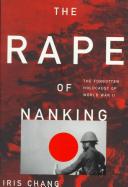The Rape of Nanking (book)

Cover of the first edition
|
|
| Author | Iris Chang |
|---|---|
| Cover artist | Rick Pracher |
| Country | United States |
| Language | English |
| Subject | Nanking Massacre |
| Publisher | Basic Books |
|
Publication date
|
1997 |
| Media type | Print (Hardcover) |
| Pages | 290 (first edition) |
| ISBN | |
| OCLC | 37281852 |
| 951.04/2 21 | |
| LC Class | DS796.N2 C44 1997 |
The Rape of Nanking: The Forgotten Holocaust of World War II is a bestselling 1997 non-fiction book written by Iris Chang about the 1937–1938 Nanking Massacre, the massacre and atrocities committed by the Imperial Japanese Army after it captured Nanjing, then capital of China, during the Second Sino-Japanese War. It describes the events leading up to the Nanking Massacre and the atrocities that were committed. The book presents the view that the Japanese government has not done enough to redress the atrocities. It is one of the first major English-language books to introduce the Nanking Massacre to Western and Eastern readers alike, and has been translated into several languages.
The book was a source of fame for Chang but was also controversial; it was received with both acclaim and criticism by the public and by academics. It has been praised as a work that "shows more clearly than any previous account" the extent and brutality of the episode, while at the same time it was criticized as "seriously flawed" and "full of misinformation and harebrained explanations". Chang's research on the book was credited with the finding of the diaries of John Rabe and Minnie Vautrin, both of whom played important roles in the Nanking Safety Zone, a designated area in Nanjing that protected Chinese civilians during the Nanking Massacre.
The book prompted AOL executive Ted Leonsis to fund and produce Nanking, a 2007 documentary film about the Nanking Massacre.
When Iris Chang was a child, she was told by her parents, who had escaped with their families from China to Taiwan and then to the United States after World War II, that during the Nanking Massacre, the Japanese "sliced babies not just in half but in thirds and fourths." In the introduction of The Rape of Nanking, she wrote that throughout her childhood, the Nanking Massacre "remained buried in the back of [her] mind as a metaphor for unspeakable evil." When she searched the local public libraries in her school and found nothing, she wondered why no one had written a book about it.
...
Wikipedia
